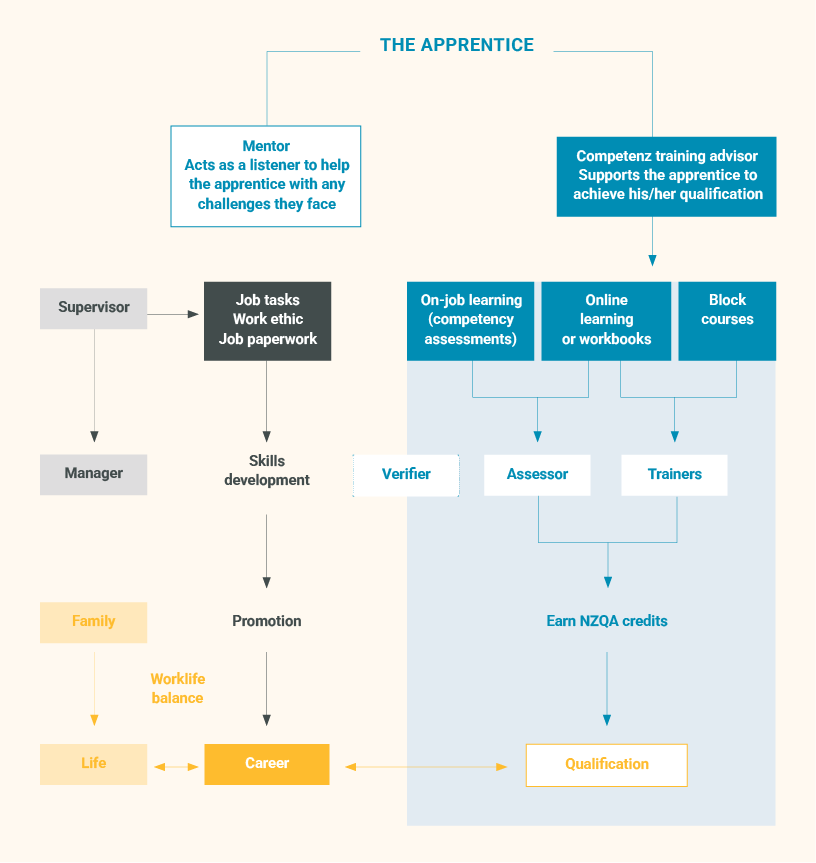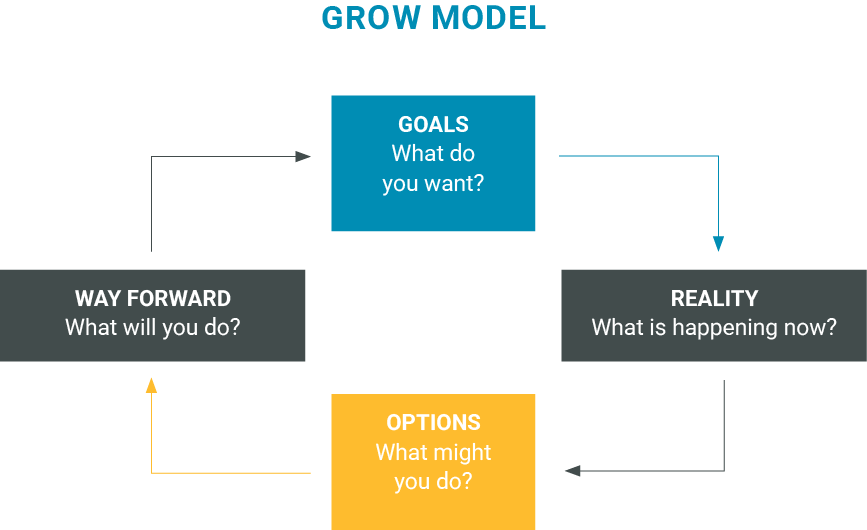
Mentoring is an essential tool for passing on wisdom, developing talent and strengthening every part of your business. It’s not just support for the apprentice — it’s an investment in the future capability of your team and your industry.
Apprenticeships can be challenging. There’s pressure to perform, a lot to learn and often a steep adjustment to the world of work. Mentoring helps apprentices navigate all of that.
A good mentor is someone they trust — someone who listens, gives perspective and helps them find their own way forward.
It’s important to understand that mentoring is different from managing or training.
A mentor focuses on the apprentice’s personal growth — offering encouragement, sharing experience, and helping them build confidence. A manager or trainer, on the other hand, is focused on tasks, targets, and performance.
Both roles are important. But they serve different purposes and work best when they’re clearly understood and separated.
Here’s how the roles compare:

“My mentor always has ideas for how I could approach things differently or get support when I need it.”
“My manager helps me too — but they’ve got a lot on, and I don’t want to seem like I’m falling behind.”
Mentoring takes commitment. The relationship builds through regular one-on-one conversations where the focus is on listening, reflecting and growing confidence.
For mentoring to be successful, it needs time, structure and a clear separation from performance management. Research shows that apprentices thrive when their mentor is not also their direct line manager — and mentors do better when they aren’t also responsible for workplace outcomes.
When mentoring is done well, the results are powerful:
Mentoring strengthens every element of an apprenticeship from skill development to motivation and retention.
It helps:
You can expect to see improvement in:
The benefits don’t stop there. Mentors often find that supporting someone else's development sharpens their own skills; things like communication, leadership and problem-solving. It’s a chance to reflect on how they work, share their knowledge and play an active role in growing your team’s capability.
When you mentor, you’re working with someone to help them succeed. Any worker can mentor others, and there are real benefits to everyone involved.
For many experienced professionals, job satisfaction comes from making a meaningful contribution. Mentoring gives senior staff a clear way to pass on their knowledge, stay engaged and feel valued. It helps retain hard-earned expertise within your business and supports succession planning.
Mentoring helps experienced workers grow beyond their technical roles. It builds communication, leadership and coaching skills — often reigniting a sense of purpose. It’s also a great way to recognise their value and expand their impact.
Offering mentoring opportunities to younger team members helps build confidence and reinforces key learning. It gives them a sense of responsibility, helps develop empathy and communication skills, and shows them that growth takes time and effort — not just instant results. It helps if the mentor has been an apprentice themselves, as they are able to draw on personal experience to guide.
Mentoring helps all parties understand and bridge cultural differences. The Māori and Pasifika Trades Training Initiative (MPTT) which includes mentoring, has been hugely successful in creating great apprenticeship opportunities.
Competenz also offers Pasifika study groups and learner support. Contact your training advisor to learn more.


Active listening is an essential part of mentoring. It means to listen fully and aim to understand what is being said. A good tip is to repeat what you think you’re hearing to make sure you’re on the right track.

GROW is a simple, practical framework that helps structure conversations — especially in mentoring. It can be used to explore goals, solve problems, or reflect on performance in a supportive, solution-focused way. The four steps are:
Start by setting a clear and specific goal. This could be short-term (e.g. completing a task) or long-term (e.g. gaining a new skill).
Good goals are SMART:
Having a clear goal gives direction and purpose to the conversation.
Explore the current situation.
What’s happening right now?
What progress has already been made?
What’s standing in the way?
This step helps bring clarity. It separates fact from assumption, and ensures the mentor and apprentice are on the same page about what’s real.
Encourage a wide range of ideas — even those that might seem out of reach. Discuss possible actions, tools or support that could help.
The aim is to open up thinking, not to jump straight to a solution. This helps apprentices develop their own problem-solving skills.
Decide on the next step.
What action will be taken, by when?
What support is needed?
This final step confirms commitment and keeps momentum going. It’s important that the apprentice owns the action — this builds motivation and accountability.

Remember to follow the mentor’s golden rule:
Always assume the person you’re mentoring has the ability to find their own answers.
Your role is to support, guide and unlock their potential — not to direct, fix or control the outcome.
Everyone learns and communicates in different ways. Understanding your own style—and your apprentice’s—can help make training more effective and conversations more productive.
One helpful framework is the VARK model, which identifies four common learning styles:
There’s no right or wrong style. Most people use a mix, but knowing what works best for your apprentice can make a big difference when planning training or giving feedback.
Take a few minutes to chat about learning preferences. It’s a simple step that can strengthen your working relationship and improve outcomes.
Support is available for learners who have literacy and numeracy challenges. Contact your training advisor for support if needed. They can access specialist support for your apprentice.
Competenz has developed the following code of ethics for apprentice mentoring relationships. These have been adapted from the Code of Ethics published by Ako Aotearoa, New Zealand, and the Code of Ethics and Standards published by the New Zealand Coaching and Mentoring Centre.
